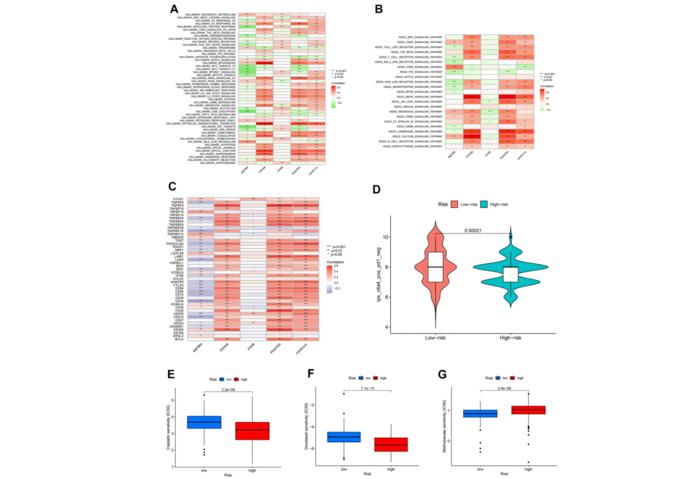“Our study introduces an oxidative stress-based prognostic model for bladder cancer, offering insights into personalized therapy.”

Credit: 2024 Dong et al.
“Our study introduces an oxidative stress-based prognostic model for bladder cancer, offering insights into personalized therapy.”
BUFFALO, NY- February 28, 2024 – A new research paper was published in Aging (listed by MEDLINE/PubMed as “Aging (Albany NY)” and “Aging-US” by Web of Science) Volume 16, Issue 3, entitled, “Prognostic model development and molecular subtypes identification in bladder urothelial cancer by oxidative stress signatures.”
Mounting studies indicate that oxidative stress (OS) significantly contributes to tumor progression. In this new study, researchers Ying Dong, Xiaoqing Wu, Chaojie Xu, Yasir Hameed, Mostafa A. Abdel-Maksoud, Taghreed N. Almanaa, Mohamed H. Kotob, Wahidah H. Al-Qahtani, Ayman M. Mahmoud, William C. Cho, and Chen Li from Shenzhen Second People’s Hospital, China Academy of Chinese Medical Sciences, Peking University, The Islamia University of Bahawalpur, King Saud University, University of Vienna, Manchester Metropolitan University, Queen Elizabeth Hospital, and Free University of Berlin focused on bladder urothelial cancer (BLCA), an escalating malignancy worldwide that is growing rapidly.
“Our objective was to verify the predictive precision of genes associated with overall survival (OS) by constructing a model that forecasts outcomes for bladder cancer and evaluates the prognostic importance of these genetic markers.”
Transcriptomic data were obtained from TCGA-BLCA and GSE31684, which are components of the Cancer Genome Atlas (TCGA) and Gene Expression Omnibus (GEO), respectively. To delineate distinct molecular subtypes, the researchers employed the non-negative matrix factorization (NMF)method. The significance of OS-associated genes in predicting outcomes was assessed using lasso regression, multivariate Cox analysis, and univariate Cox regression analysis. For external validation, they employed the GSE31684 dataset. CIBERSORT was utilized to examine the tumor immune microenvironment (TIME). A nomogram was created and verified using calibration and receiver operating characteristic (ROC) curves, which are based on risk signatures. The team examined variations in clinical characteristics and tumor mutational burden (TMB) among groups classified as high-risk and low-risk. To evaluate the potential of immunotherapy, the immune phenomenon score (IPS) was computed based on the risk score. In the end, the pRRophetic algorithm was employed to forecast the IC50 values of chemotherapy medications.
“In our research, we examined the expression of 275 genes associated with OS in 19 healthy and 414 cancerous tissues of the bladder obtained from the TCGA database.”
As a result, a new risk signature was created that includes 4 genes associated with OS (RBPMS, CRYAB, P4HB, and PDGFRA). The researchers found two separate groups, C1 and C2, that showed notable variations in immune cells and stromal score. According to the Kaplan-Meier analysis, patients classified as high-risk experienced a considerably reduced overall survival in comparison to those categorized as low-risk (P<0.001). The predictive capability of the model was indicated by the area under the curve (AUC) of the receiver operating characteristic (ROC) curve surpassing 0.6. Their model showed consistent distribution of samples from both the GEO database and TCGA data. Both the univariate and multivariate Cox regression analyses validated the importance of the risk score in relation to overall survival (P < 0.001). According to their research, patients with a lower risk profile may experience greater advantages from using a CTLA4 inhibitor, whereas patients with a higher risk profile demonstrated a higher level of responsiveness to Paclitaxel and Cisplatin. In addition, methotrexate exhibited a more positive outcome in patients with low risk compared to those with high risk.
“Our research introduces a novel model associated with OS gene signature in bladder cancer, which uncovers unique survival results. This model can assist in tailoring personalized treatment approaches and enhancing patient therapeutic effect in the management of bladder cancer.”
Read the full paper: DOI: https://doi.org/10.18632/aging.205499
Corresponding Authors: Yasir Hameed, William C. Cho, Chen Li
Corresponding Emails: [email protected], [email protected], [email protected]
Keywords: oxidative stress, bladder urothelial cancer, tumor microenvironment, immunotherapy
Click here to sign up for free Altmetric alerts about this article.
About Aging:
Launched in 2009, Aging publishes papers of general interest and biological significance in all fields of aging research and age-related diseases, including cancer—and now, with a special focus on COVID-19 vulnerability as an age-dependent syndrome. Topics in Aging go beyond traditional gerontology, including, but not limited to, cellular and molecular biology, human age-related diseases, pathology in model organisms, signal transduction pathways (e.g., p53, sirtuins, and PI-3K/AKT/mTOR, among others), and approaches to modulating these signaling pathways.
Please visit our website at www.Aging-US.com and connect with us:
- X, formerly Twitter
- YouTube
- Spotify, and available wherever you listen to podcasts
Click here to subscribe to Aging publication updates.
For media inquiries, please contact [email protected].
Aging (Aging-US) Journal Office
6666 E. Quaker Str., Suite 1B
Orchard Park, NY 14127
Phone: 1-800-922-0957, option 1
###
Journal
Aging-US
DOI
10.18632/aging.205499
Method of Research
Computational simulation/modeling
Subject of Research
People
Article Title
Prognostic model development and molecular subtypes identification in bladder urothelial cancer by oxidative stress signatures
Article Publication Date
1-Feb-2024




